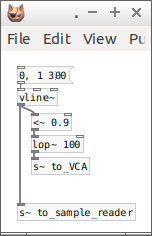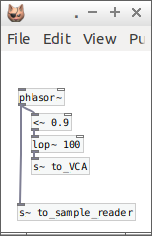I need to trigger a bang when a at the beginning of the oscillation of phasor~. From my patch you will see that i have used [sel 0.999 but it doesn't detect this value from snapshot~. Is there a method that works for this?
Many thanksprac.pd
bang to happen at beginning of phasor
I need to trigger a bang when a at the beginning of the oscillation of phasor~. From my patch you will see that i have used [sel 0.999 but it doesn't detect this value from snapshot~. Is there a method that works for this?
Many thanksprac.pd
Try this:
[phasor~ 1]
|
[threshold~ 0.1 10 0.1 10]
|
[o]
The bottom object is a bang
Supposing what you want is a bang at the beginning of each phasor~ cycle, I was going to suggest a [vline~] driven by a [metro]. But it will be less precise to useless at higher frequencies, so it depends what you will be using it for. Trying to send bangs at high frequencies itself can probably hang your system too.
thanks threshold works well.
I want to experiment with triggering a bang right at the end of phasor but
[threshold~ 0.9 10 0.9 10]
doesn't work what have I got wrong here?
I assumend when you wrote [threshold~ 0.1 10 0.1 10] that 0.1 is the begining of the cycle?
....From the patch I've hopfully its clear that I'm sending a bang to vline to dip the volume monumentally to avoid popping sounds when hopping around the sample
prac.pd heres the latest patch. the current code im focused on is in the bottom right next to the comment "dip volume at the end of phase period"
Many thanks
I haven't checked the patch yet, but some thoughts. If you're already using vline~ then why not use a second one running in sync for the volume dip. Like say the ramp runs on a message that says [0, 1 100(, the second, for the volume control could go [0, 1 10 0, 0 10, 90( [that is 10 ms fadein and 10 ms fadeout] - both executed by the same bang.
Also, if you're using Purr Data, as I suspect from your other thread, you have access to some audio math that can do comparisons, like <~, >~, etc. Rather than the threshold, you could just use a [<~0.9] after vline~ and lopass filter its output for desired slopes. Like this:
[vline~]
| |
| [<~ 0.9] (will produce 1 when true, 0 when false)
| |
| [lop~ 100] (will produce an exponential slope lasting roughly 1000/100 msec)
| |
| [send to VCA]
|
[send to sample reader]
i think its awkward using them in sync because the vline that works with the radio labbled sample hop also stores a value as to where to hop to when trigger the vline. And that doesn't want to happen each time a phase is complete ...if i'm interpreting what you're saying correctly
Ah, ok, more manipulation is going on. Check my second suggestion:

But you could also have several custom messages for the volume control vline~ depending on what is being done with the sampleread vline~
Let me check your patch before I talk again...
---edit---
Ok, I see now that you are using phasor to drive the samplereading. My setup would then look like this:

You can change the values on the [<~] and [lop~] to suit your needs
I don't have purr data on the pi. But would you be able to look at this updated patch?
I tried unsig to 0.9 but it didn't quite work as expected .
the lastest code is commented with "latest dip from threshold"...it should work but if you load a sample and make the left llimit and right limit quite small pops still occur?prac.pd
Im pretty sure the [<~] is in the pd extended distribution as well... You are doing 1ms dips. I'd expect that to produce audible clicks under any circustances, unless you are lucky to hit a suffiecntly low-amplitude spot of the sample. Try increasing the duration and slope of your dips
I've adjusted the 10 but its as if the bang from (well threshold is what im using) isn't trigger the line to move
in the file sampler.pd the specfic code is found in the subpatch [pd lnrlim.
May I get your take on what i've written
I'll take a look at it. It would really help if you included some or at least one of the samples in your zip
Oops! Looks like something went wrong!